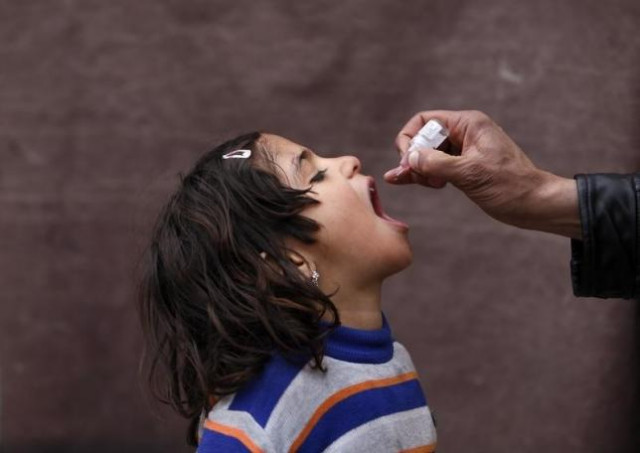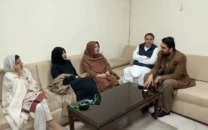Over a million K-P parents refused polio vaccination in 2019
79 of Pakistan's total 111 cases this year have been reported in Khyber Pakhtunkhwa

PHOTO: REUTERS
Data from the provincial health department showed a total of 10,89,087 parents refused polio vaccination for their children, with the highest number of refusal cases - 6,94,984 - reported in April.
Officials said a total of 79 cases have been reported in K-P in 2019 and the number is expected to rise before the year's end.
"Negative propaganda against the polio vaccine, particularly the Mashokhel incident, had a significant impact in K-P. The doubts created by that false propaganda dealt a serious blow to anti-polio efforts this year," said a senior official.
Polio team possible target in Lakki Marwat suicide bombing
He said the department had once again sought the cooperation of religious scholars to counter the negative propaganda, and political leaders were having their children vaccinated in a bid to dispel the false notions.
A difficult year
2019 has been a particularly bleak year for Pakistan's anti-polio efforts as the national tally hit 111 earlier this week.
The alarmingly high figure was confirmed by officials after seven new cases of polio were reported from across the country. Four of the new cases were confirmed in K-P - three in Laki Marwat district and one in Tank.
Of the 111 cases reported in Pakistan this year, 79 are from K-P, 17 from Sindh, nine from Balochistan, and six from Punjab.
Over the past few years, successive governments have introduced awareness campaigns to allay concerns of parents and counter anti-vaccination propaganda. Most of them end up refusing the polio vaccine due to the negative narrative about it.
Cases of non-compliance often go unreported as health workers face difficult choices in remote areas where kinship can often place them under severe pressure.
According to experts, the challenges against the viral illness, that in its most severe form causes nerve injury leading to paralysis, have been compounded due to loopholes in the campaign, lack of training, false rumours associating the vaccine to fainting spells — or even that it killed dozens of children, families denying access to children, and above all fake markings on the fingers of children to dodge vaccinators.
Misinformation to blame for polio challenge in K-P
As a result, new polio cases continued to surface from the south and eastern districts of K-P all through the year, with the situation being particularly bleak in the tribal areas, where displaced families, routinely refuse to cooperate with vaccinators.
The Mashokhel incident
In April, fuelled by rumours on social media that children were being poisoned by the vaccinations, mobs rioted in Khyber Pakhtunkhwa and at least three polio workers were killed.
The fake video circulated from the Mashokhel area purportedly showed children suffering reactions after receiving polio drops.
The news spread like wildfire in Peshawar, forcing panicked parents to rush their children to hospitals. Irked by the visuals, protesters even torched a Basic Health Unit (BHU) in the Mashokhel village.
To pacify protesters, the provincial government conducted an inquiry. But that was too little, too late to rescue the campaign that had been maligned by the spread of misinformation.
Since then, an increasing number of parents have refused polio vaccination for their children. In January 2019, 60,959 families refused polio vaccination in K-P; 32,311 in February; 78,961 in March; and 69,920 in June.



















COMMENTS
Comments are moderated and generally will be posted if they are on-topic and not abusive.
For more information, please see our Comments FAQ